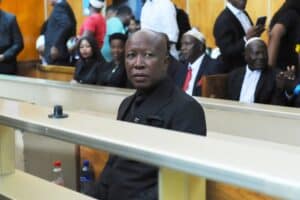Instead of protecting the fund, the former ANC MP 'colluded with other public officers to defraud the fund for self-benefit'.

The Supreme Court of Appeal (SCA) recently rejected former ANC MP Manyaba Rubben Mohlaloga’s bid to overturn his 20-year imprisonment for stealing R6 million from a government agricultural empowerment fund.
The court dismissed his appeal of his sentence and struck his application for reconsideration of his conviction from the roll.
Mohlaloga, who chaired parliament’s portfolio committee on agriculture, was found guilty of fraud and money laundering under the Prevention of Organised Crime Act for plundering the Agricultural Broad-Based Black Economic Empowerment (AgriB-BBEE) Fund between 2007 and 2008.
ANC MP AgriB-BBEE fraud background
Parliament created the AgriB-BBEE programme to provide financial assistance to previously disadvantaged farmers.
“Its objective was to facilitate broad-based black economic empowerment in the agricultural sector,” the court noted.
According to the court, the initiative aimed “to include black South Africans at all levels of agricultural activity and enterprises along the entire agricultural value chain.”
The National Department of Agriculture and Land Bank established the fund with R100 million from National Treasury.
Applications require assessment according to the AgriB-BBEE Operational Manual, with the National Advisory Panel responsible for approvals or rejections.
Crucially, the manual’s paragraph 5.5.1 “explicitly provided that politicians, while holding public office and government employees do not qualify and will not be eligible for grants from the Fund.”
ALSO READ: Masemola in firing line over multimillion-rand buildings acquisition [VIDEO]
Conspiracy takes shape
The court found that the fraudulent scheme began when Mohlaloga approached Tjia, head of the Limpopo Youth Commission, proposing that they seek project funding.
Mohlaloga later met Tjia and attorney Nkhwashu at his Polokwane residence to discuss “embarking on a broad-based youth empowerment project to empower, educate and employ the youth”.
When acting Land Bank CEO Mohlahlane informed them they qualified for a R3 million grant, the court found their plans immediately shifted.
“Mr Mohlaloga and Mr Tjia immediately changed plans and the idea of a broad-based empowerment programme was abandoned,” Justice Kathree-Setiloane wrote. “They decided to buy a farm on receipt of the grant.”
The transformation was telling. “It was apparent, from that point on, that they intended to make a profit from the project, and it ceased to be a broad-based empowerment programme,” the judgment states.
Circumventing legal barriers
When Mohlahlane informed the group about the manual’s politician prohibition, Mohlaloga devised a workaround.
“On being informed of this, Mr Mohlaloga instructed Mr Tjia to make the application,” the court found.
The deception deepened when Mohlahlane submitted a typed application with a forged signature instead of Tjia’s handwritten version.
He told fund manager Mosoma “that the minister was extremely frustrated because there was no progress with the empowerment programme and instructed him to prepare the payment documents”.
ALSO READ: Man sentenced for defrauding Amtola Water Board in tender scam
Bypassing due diligence
The payment authorisation violated every procedural safeguard. “There was no formal application, no business plan or due diligence performed on the project,” the court found.
“The application was also never considered or approved by the NAP [National Advisory Panel].”
When auditors later investigated, officials scrambled to create documentation.
“A paper trail was created, and various documents were falsified in an attempt to mislead the auditors,” Jude of appeal, Fayeeza Kathree-Setiloane noted.
“But for the audit, the transaction would never have been discovered.”
Rapid depletion of funds
On 1 February 2008, R6 million flowed from the fund to Nkhwashu’s law firm trust account.
The money disappeared with stunning speed. “Within a period of three months from date of payment of the R6 million into the DKD attorneys’ trust account, an amount of only R22 641.44 remained,” the court found.
Mohlaloga extracted substantial personal benefits.
He reportedly received R80 000 directly into his personal account, while R866 150 was used to purchase two BMW vehicles registered in his name.
According to court records, another R2.8 million went to his family trust in three instalments during April 2008.
The court detailed additional personal spending: “He transferred R10 000 to the account of his wife, bought art for R30 000 and a timeshare for R61 000. He also bought a stationary business for a total of R263 771.”
Most tellingly, R2.29 million from his family trust purchased Schuinshoek farm, with the court noting this was done “as a smoke screen to prevent detection and fool the auditors”.
ALSO READ: Hawks arrest second suspect in R1.3m vehicle fraud case
No exceptional circumstances found
Mohlaloga’s reconsideration application claimed “blatant misapplication of fundamental legal principles” constituted exceptional circumstances warranting review.
He argued the case would “result in an irreparable injustice” and lead to “a travesty of justice”.
Kathree-Setiloane rejected these arguments.
“I am unable to find that exceptional circumstances exist in this case that warrant a reconsideration of the decision refusing leave to appeal,” she wrote.
“The errors which the high court is said to have made ultimately turn on the evaluation of the evidence and findings of fact and law which have been raised before.”
Moreover, the court emphasised that exceptional circumstances require “circumstances which give rise to a probability of grave individual injustice, or the administration of justice might be brought into disrepute if no reconsideration occurs.”
Former ANC MP sentence appeal fails
Mohlaloga argued his 20-year effective sentence was “shockingly disproportionate to the convictions of fraud and money laundering.”
The court disagreed, noting the Criminal Law Amendment Act prescribes minimum 15-year sentences for fraud exceeding R500,000.
While acknowledging mitigating factors like Mohlaloga being a first offender with family responsibilities and university education, Kathree-Setiloane found aggravating circumstances far outweighed these considerations.
ALSO READ: Home Affairs fires five more officials linked to fraud and sexual assault
Betrayal of public trust
The court highlighted Mohlaloga’s position of responsibility. “Mr Mohlaloga played a pivotal role in the commission of the offences while he was an elected member of parliament and Chairperson of the Portfolio Committee on Agriculture,” the judgment states.
“In electing him to parliament, the electorate put their trust in Mr Mohlaloga. He, however, abused that trust by perpetrating the crime of fraud against the Fund which was funded by taxpayers’ money,” Kathree-Setiloane said.
The judge emphasised the programme’s noble purpose.
“AgriB-BBEE was a noble project that was intended to uplift and empower previously disadvantaged and emerging farmers in the agricultural sector to progress to commercial farming.”
Instead of protecting the fund, “he colluded with other public officers to defraud the Fund for self-benefit.”
The court found the conspirators “committed the offences out of pure greed” with “no evidence that they needed the money to survive.”
Unrepentant attitude
Mohlaloga’s trial demeanour particularly troubled the court.
“Despite being given an opportunity to repay the money by the regional court, Mr Mohlaloga failed to do so,” Justice Kathree-Setiloane observed.
“It is clear from his testimony during the trial that he lacked remorse.”
The court quoted his defiant trial testimony: “I do not know what you mean by Land Bank money, because once the money is approved and given to the beneficiary, it belongs to the beneficiary.”
According to Justice Kathree-Setiloane, this attitude reflected his fundamental misunderstanding of the fund’s purpose.
“He failed to recognise that the grant was intended to empower disadvantaged people in the agricultural sector, and that by defrauding the fund, he was denying those who most needed its financial assistance,” the court found.
ALSO READ: ActionSA lays fraud charges against NW municipal manager
Societal impact
Kathree-Setiloane emphasised corruption’s broader consequences.
“Corruption and white-collar crime in state-owned entities lead to economic decline, job losses, more poverty, and reduced public trust,” she said.
“Unless those convicted of such crimes receive appropriate sentences, public confidence and participation in government institutions would be completely eroded, leading to increased inefficiencies and possible collapse,” the court warned.
Final ruling
Applying established sentencing principles, considering offence gravity, offender circumstances, and public interest, the court upheld the sentence.
“I am of the view that an effective sentence of 20 years’ imprisonment is not shockingly inappropriate,” Kathree-Setiloane concluded.
The court noted that “by the end of April 2008, there was no money left for the project. A total amount of R3 600 000 was paid to Mr Mohlaloga.”
Except for the farm purchase funds, “nothing has been paid back”.
The Supreme Court of Appeal ultimately struck Mohlaloga’s reconsideration application from the roll and dismissed his sentence appeal, confirming his two-decade imprisonment for the R6 million fraud that robbed resources from South Africa’s most vulnerable farmers.
READ NEXT: Eskom burns nearly R6 billion on diesel to keep lights on during winter






